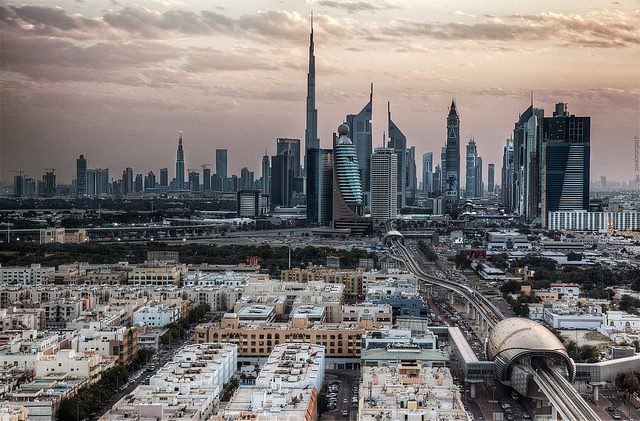 In the third of a series of interviews with LAB affiliates, Dr Ali Kadri unpacks a complex and violent account of financialisation, militarisation and oil in the Middle East, and explains how human rights and sovereignty over natural resources of disempowered national working classes challenge economic orthodoxy. Situated in LSE’s Centre for the Study of Human Rights and directed by Dr Margot Salomon, the Laboratory for Advanced Research on the Global Economy (LAB) probes the challenges posed by the complexities of the global economy and their implications for human well-being. LAB has been set up to create a dynamic space for research, from the conceptual to the practical and across disciplines, on the myriad places where human rights, fairness and justice intersect with economic globalisation.
In the third of a series of interviews with LAB affiliates, Dr Ali Kadri unpacks a complex and violent account of financialisation, militarisation and oil in the Middle East, and explains how human rights and sovereignty over natural resources of disempowered national working classes challenge economic orthodoxy. Situated in LSE’s Centre for the Study of Human Rights and directed by Dr Margot Salomon, the Laboratory for Advanced Research on the Global Economy (LAB) probes the challenges posed by the complexities of the global economy and their implications for human well-being. LAB has been set up to create a dynamic space for research, from the conceptual to the practical and across disciplines, on the myriad places where human rights, fairness and justice intersect with economic globalisation.
Below is the interview, which can be downloaded in full here.

What role do oil prices play in the global economy and why might it matter to human rights?
If one were to consider the sensationalised view of oil or the opinion that holds that oil is an uniquely suitable source of energy, then the case may be that the expansion of the world’s population from around 2 billion in 1925 to 7 billion (currently) could not have been possible without the energy that oil had provided. However, that is a perspective that bestows upon oil, the commodity itself, a life of its own, when in fact our dependence on oil is ordained by a set of social relationships that necessitates the use of oil for profit making as opposed to alternative sources of energy that respect social and environmental concerns. When our way of reproducing society (maintaining the needs of society from one period to the next by social measures) shifts from being dictated by the profit criterion to the social value criterion (as in goals which are common to society as a whole), research into the employment of other sources of energy may lead to equal or maybe better sources of energy.
Nevertheless, oil and fuels represent the foremost traded commodity globally. Oil is also important because variants on the initial commodity make up the inputs of nearly all the manufactured commodities. But oil is a strategic commodity because countries that depend on oil imports for their energy and have no immediate sources to replace oil become extremely vulnerable on the security front, if and when oil shortages arise. Hence, for the hegemonic powers, especially the US, controlling the sources of oil in the Arab world by subjugating or subverting the governments of oil rich countries can become a source of immense power and/or a weapon of strategic value. For the US, the power emanating from hegemony over oil resources underwrites the issuance of the world reserve currency, the dollar, and many other imperial rents wrought as a result of its imperial status.
Oil is relevant to human rights because it provides the energy with which many rights-based essentials for sustaining life are produced. Food, shelter, water and health, etc. require energy and oil by-products as inputs. If the price of oil and fuels rises, then the price of these right-endowed services and commodities rises. Fuel prices could also rise as a consequence of subsidy removal.
When the World Bank demands lifting subsidies on fuels, the cost of these essential services and commodities also rises. As such, many in the poorer strata will be deprived of their right to food and other basic needs for a decent life. Energy is necessary to grow food, and most of the energy comes from oil (irrigation, electricity, machine operation, etc.). These subsidies-lifting or austerity measures, as happened in Egypt recently, dissipate the wealth of society and violate many human rights principles.
The already poor rural areas usually bear the brunt of these contractionary policies (fiscal austerity and subsidy removal). UNICEF, for instance, reported in 2009 that one in three Egyptian children suffers from malnutrition, hence, the annulment of subsidy further deprives needy children of food1.
Not only that, the policy of subsidy removal on essentials in poorer countries is also wasteful from the purely ‘positive-science’ point of resource allocation. Because the institutions that allocate resources are commandeered by the wealthier class, which stands to benefit from rent grab and national resource divestiture, the supposed welfare gains that would ensue from removing price distortions (subsidies) had they existed at all, would not be imparted to the poorer working strata. In any case, welfare gains cannot ensue from this policy because it is fiscally contractionary. Moreover, in an Arab de-industrialising and open capital and trade accounts context, the globally integrated ruling class, through the channels of finance uses every means possible to usurp the social product of the national economy. Foremost in these are the stance of the dollar-pegged exchange rate, which draw down the reserves of central banks to stabilise the national currency in the dollar, so that the wealth of the national ruling class may hold its stable dollar-value in the international markets. There are two clarifications to note here: a) the ruling classes’ earnings are safer abroad when held in so-called ‘risk free’ assets like the dollar, so naturally, investors seek the safer broader international markets, and; b) when the central banks expend dollars to prop up the national exchange rate vis-à-vis the dollar (keeping it pegged to the dollar), the working class benefits as the price of imported dollar-priced wheat, for instance, becomes indirectly subsidised; however, the channelling of credit into speculation on national assets like real estate, which pushes its price up, allows the financially integrated ruling class to convert its rising gains from liquidating national assets at guaranteed dollar prices. In the end result, the subsidy provided to the richer class, as a result of the peg, ends up eroding national funds and forcing a removal of subsidy to the poorer working class.
Oil, however, is very crucial to human rights because it is a principal reason for war making. Oil violates the right to security of person and communal security, especially in the Arab World. As early as the 1970’s, the late Saudi novelist, Abdul Rahman Munif, whose prose had beautifully captured the way oil had torn asunder the old social relationships of Arab society, disengaged women from village type agricultural production and left open the ideological space for Wahhabism to act as spiritual repository for parasitism, he had also laid down the equation that in the dialectic of oil, each drop of oil equals a drop of blood. Strategic oil interests justify the existence of brutal monarchies and despotic Arab regimes that serve as suzerains of American empire. Oil control feeds into the other two most relevantchannels of the global economy: militarisation and financialisation.
Together, the threesome, oil, weapons and the dollar, represent the tripod upon which the signal of the profit rate signals the death tolls from wars. It is not oil the commodity itself that has to change as a commodity or any alternative energy source that would replace oil as a commodity that would also have to change, it is the criterion that organises the relationships by which societies reproduce themselves by commodifying the basic goods that are required to sustain life that has to change.
When man and nature are organised around more common social goals, other than profiteering by privatising water, air and vital medication, to name a few, one may possibly see the oil addiction getting kicked.
 Prior to joining the Middle East Institute at the National University of Singapore, Ali Kadri was Visiting Fellow at the Department of International Development at LSE and Head of the Economic LSE Laboratory for Advanced Research on the Global Economy Analysis Section at the United Nations regional office for Western Asia. He is a member of the Sounding Board of the Laboratory for Advanced Research on the Global Economy in the Centre for the Study of Human Rights at LSE.
Prior to joining the Middle East Institute at the National University of Singapore, Ali Kadri was Visiting Fellow at the Department of International Development at LSE and Head of the Economic LSE Laboratory for Advanced Research on the Global Economy Analysis Section at the United Nations regional office for Western Asia. He is a member of the Sounding Board of the Laboratory for Advanced Research on the Global Economy in the Centre for the Study of Human Rights at LSE.






Quality posts is the secret to invite the users to pay
a quick visit the web site, that’s what this site is providing.
Middle East Centre – LAB ‘views: Interview with Dr Ali Kadri
roger vivier online http://www.vivierparis.com